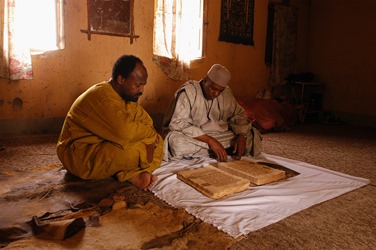In one of our previous blog posts, we introduced the plight of Timbuktu ancient manuscripts in Mali during the ongoing war.[i] As recent report says, after being rescued from the Islamic fundamentalists, these materials were relocated to South Mali, which has caused new threats to them. Now they are facing preservation issues caused by humidity in their new home. This area is much more humid than Timbuktu, which is very arid. After being moved to South Mail, these manuscripts are still kept in footlockers, which are not moisture proof. These manuscripts are printed on rag paper and are very fragile to the humidity. Some manuscripts are already damaged by the moisture,[ii] showing signs of mildew and rot.[iii] The damage will become more severe if these manuscripts are not better preserved by mid June, the rain reason of Mali.
In order to gain outside help rescuing these manuscripts, Timbuktu librarians launched a campaign to raise funds for preserving these materials. Approximately 7 million dollars are needed to purchase archival boxes and humidity traps to keep these manuscripts before they can be returned to Timbuktu. In view of the time limit, Timbuktu librarians used multiple approaches to seek outside help. This effort has been promoted in a variety of ways, including CNN news channel, Facebook, twitter, and Reddit. All of them are gaining considerable attention. An Indiegogo channel was created to collect donations. As of the close of the campaign, on June 20, 2013, $67,446 was collected out of the $100,000 asked for.[iv] You can still contribute to the manuscripts cause through a Pay Pal account linked from the T160K website.
This campaign is a perfect illustration of using Internet to promote library activities. Internet spreads information much faster than the traditional library outreach approaches, such as poster, departmental collaboration, exhibits, etc. The funding Timbuktu library gets on Indiegogo increases exponentially day by day. It also collects a much larger audience. This campaign gets supporters from Facebook users, Twitter users, CNN followers, and Reddit readers. Other libraries can learn this experience for their own outreach. Despite of some limits of mass media promotion for library activities and fundraising, such as less targeted user group and some security issues, it does bring a faster and more influential option to future library promotion. Also, other online resources could also be used to collect user experience information and other feedback to improve library services and increase our influence all around.
For more information on the manuscript rescue, listen to the interview of Abdel Kader Haidara on BBC Outlook: http://www.bbc.co.uk/programmes/p01b19d6.
[i] Denise Rayman. (2013) The Timbuktu Library Burnings and the Importance of Library Disaster Planning. http://publish.illinois.edu/iaslibrary/2013/03/01/the-timbuktu-library-burnings-and-the-importance-of-library-disaster-planning/
[ii] Timbuktu Libraries in Exile. http://www.indiegogo.com/projects/timbuktu-libraries-in-exile
[iii] Saved from Islamists, Timbuktu’s manuscripts face new threat. http://www.cnn.com/2013/05/28/world/africa/timbuktu-manuscripts/index.html?iref=allsearch
[iv] Timbuktu Libraries in Exile. Indiegogo. http://www.indiegogo.com/projects/timbuktu-libraries-in-exile

